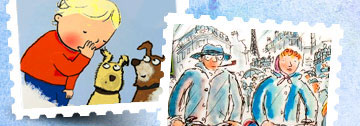


Becoming a Writer. . .
There were already two Louises in my family when I was born: my mother and my grandmother, Nana, who lived with us when I was growing up. So early on, I was given the name Leezie. This is a name that my family still calls me. Years later, my niece was born and also named Louise. Then there were four of us with the same name! Louise is a fine name to have except that people often spell it incorrectly. Sometimes my mail is addressed to Louisa, or Louisie, or Lewis, or Lois. Leezie is also tough for people to spell. Names and their pronunciations have always interested me, so writing about a teacher named Mrs. Kempczinski was a natural thing for me to do.
I grew up in a house at the top of a steep street in Cincinnati, Ohio, the kind of street that is a big challenge when you are pedaling uphill on your bicycle. My two sisters and I used to ride our bikes down, down our street, and then to the local dimestore to buy candy bars or meet up with our friends. But coming home, we had to pedal up our long hill. (This was before mountain bikes!) Pedaling slowly up my street may be where I learned perseverance, something all writers need when they are working alone at their desks.
I attended a small elementary school and that is where I became a lifelong reader. I read chapter books, biographies, and stories that took me far-away to other countries and cultures. I loved our school library and those shelves of books. So it is a thrill for me today to know that some of my books are being read by children in other libraries all over the country. I didn't know then, reading those books in the Lotspeich School library, that I would someday become a writer. When I was in third grade, I wanted to be a composer. I was taking piano lessons, and my teacher was Miss Cornn, the music teacher in our school. Everyone loved Miss Cornn, and I loved her especially becouse we shared a name. Her name was Louise too. My idea about being a composer was short-lived as I could never learn to read music—much less write it, and after a few years, I gave up taking piano lessons. But Louise Cornn remains a key person in my elementary school memories. (And yes, her last name is spelled with two n's).
Writing picture books came much later—after studying history in college, getting married, and raising three children. Even though I didn't grow up to be a composer, I like to think that my picture books are almost songs because the sound of words and the poetry of my style are so important in the texts that I write. I work very hard at my desk, revising and revising and revising, trying to find just the right words that will be beautiful or fun to read.
Now it is hard for me to separate my writing from the way I live my life. My own family, personal experiences and friendships, as well as a love of history and travel, have rich and lasting connections to the books I write. The first impulse to write a book is always triggered by something that has touched me indelibly. The challenge is to combine language with a story line that can stand up to countless readings.
Some of the stories in my books are made up, and others are true. A few of my books are non-fiction biographies. All of my writing comes from within: I care deeply about the people, the places and the events that I write about. I hope that all my books celebrate what I think is important, and what I care about in life.
Ordinary children are the characters in my fiction: they are kids like I was years ago. I place them in a variety of settings, some historical and some contemporary. I feel as if I am living these experiences when I am doing the research and the writing for my books. And then I want to take the reader there, to a school classroom or to a winter canal in the Netherlands or to a beach at Dunkirk, through my words. Henry Price, who lived in Boston on the eve of the American Revolution, and Ann Zesterman, whose third-grade teacher had cancer, are ordinary kids who have the same universal feelings that we all share.
I have spoken in hundreds of schools in the past few years, and met many students, teachers, librarians and parents. Often I am in my car, driving to new places to meet new people, and to talk about writing. I have a lot of thinking time on those miles. And I have a lot of thinking time when I am working in my garden at home. Thinking time: It's so very essential for a writer. I think about new ideas for books, and new ways to write them. I think about what is important to me, and the new things that I want to learn. I think about the books I read as a child—and the books I am reading today. I think about my family who are my great encouragers. And my wonderful editors who understand, in just the right way, my creative vision for a picture book. These thoughts always inspire me to return to my desk and begin working on a rough draft for a new manuscript. I feel very, very lucky because I love what I do. I type my name on the first page and sit for a moment and look at it: Louise Borden. That's me, Leezie, who took piano lessons from Miss Cornn, and pedaled her bike slowly up the street. That's me, one of many Louises. Now I'm a writer.

